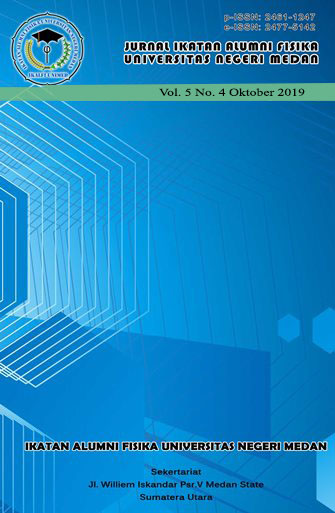EFEK MODEL PROBLEM BASED LEARNING (PBL) TERHADAP PENINGKATAN KEMAMPUAN PEMECAHAN MASALAH SISWA
DOI:
https://doi.org/10.24114/jiaf.v5i4.15352Keywords:
Kata Kunci, Problem Based Learning, Kemampuan Pemecahan MasalahAbstract
ABSTRAKTujuan Penelitian ini untuk mengetahui pengaruh yang signifikan model pembelajaran Problem Based Learning terhadap kemampuan pemecahan masalah siswa pada Materi Pokok Momentum dan Impuls di Kelas X Semester II SMA N 21 Medan T.P. 2018/2019. Metode penelitian ini adalah quasi eksperimen dengan populasi dalam penelitian ini kelas X Mia 1 sebagai kelas eksperimen yang diterapkan dengan model Problem Based Learning dan kelas kontrrol menggunakan model konvensional yang berjumlah 30 siswa. Instrument yang digunakan dalam penelitian ini adalah tes kemampuan pemecahan masalah dalam bentuk essai sebanyak 6 soal yang telah dilakukan uji persyaratan tes untuk mengukur hasil belajar. Dari hasil penelitian diperoleh nilai rata-rata pretes kelas eksperimen adalah 30,36 dan nilai rata-rata kelas kontrol adalah 28,58. Hal ini menunjukkan bahwa kemampuan awal kedua kelas adalah homogen. Kemudian diberikan perlakuan yang berbeda, kelas eksperimen dengan model pembelajaran berdasarkan masalah yang memiliki 5 sintaks dan kelas kontrol dengan model pembelajaran konvensional. Setelah pembelajaran selesai diberikan postes dengan hasil rata-rata kelas eksperimen 79,07 dan kelas kontrol 61,20. Hasil analisis uji t satu pihak diperoleh thitung = 9,480 dan ttabel = 1,671 untuk a = 0,05 sehingga thitung > ttabel (9,480 >1,671) maka Ho ditolak, dengan demikian diperoleh kesimpulan bahwa ada pengaruh model pembelajaran Problem Based Learning terhadap Kemampuan Pemecahan Masalah siswa pada materi pokok Momentum dan Impuls di SMA N 21 Medan T.P 2018/2019. ABSTRACTThe purpose of this study was to determine the significant effect of Problem Based Learning learning models on students' problem solving abilities in the Main Material Momentum and Impulse in Class X Semester II SMA N 21 Medan T.P. 2018/2019. This research method is quasi-experimental with the population in this study class X Mia 1 as an experimental class that is applied to the Problem Based Learning model and the classroom control using a conventional model of 30 students. The instrument used in this study is a test of problem solving ability in the form of essays as many as 6 questions that have been tested for test requirements to measure learning outcomes. From the results of the study, the average value of the experimental class pretest was 30.36 and the average value of the control class was 28.58. This shows that the initial ability of the two classes is homogeneous. Then given a different treatment, the experimental class with a problem based learning model that has 5 syntax and control classes with conventional learning models. After learning is finished, the posttest is given with the results of the experimental class averages 79.07 and the control class 61.20. The results of the one-party t-test analysis obtained tcount = 9.480 and ttable = 1.671 for 5 = 0.05 so that tcount> ttable (9,480> 1,671) then Ho was rejected, thus it was concluded that there was influence of the Problem Based Learning learning model on students' Problem Solving Abilities in the subject matter of Momentum and Impulse in SMA N.21 Medan T.P 2018/2019.References
Amelia, N., Sinuraya, J, (2015), Pengaruh Model Pembelajaran Inquiry Training dan Motivasi Terhadap Hasil Belajar Sisiwa Pada Materi Pokok Fluida Statis Kelas X Semester II Salah Satu SMA Di Percut Sei Tuan T.P 2014/2015, Jurnal Inpafi, 3(4).
Argaw, A, S., Haile, B, B., & Ayalew, B, T., Kuma, S, G, (2017), The effect of Problem Based Learning (PBL) Instructionon Student™s Motivation and Problem Solving Skills of Physics, EURASIA Journal of Mathematis Science and Technology Education, 13(3). 857-871.
Arends, R, I, (2013), Learning To Teach Edisi Kesembilan, Salemba Humanika, Jakarta.
Bakar, A., Panjaitan, M, E, (2017), Pengaruh Model Problem Based Learning Terhadap Kemampuan Pemecahan Masalah Pada Materi Suhu dan Kalor, Jurnal Inovasi Pembelajaran Fisika (INPAFI), 2337-4624.
Dewi, P., Sadia, W., & Suma, K, (2014), Pengaruh Model Problem Based Learning Terhadap Kemampuan Pemecahan Masalah Fisika Melalui Pengendalian Bakat Numerik Siswa SMP, Jurnal Program Pasca Sarjana Universitas Pendidikan Ganesha, 4.
Nasution, U, S., Sahyar., & Sirait, M, (2016), Pengaruh Model Problem Based Learning dan kemampuan Berpikir Kritis Terhadap Kemampuan Pemecahan Masalah, Jurnal Pendidikan Fisika, 5(2): 2301-7651.
Pelawi, H, S., Sinulingga, K, (2016), Pengaruh Model Problem Based Learning dan Motivasi Belajar Terhadap Hasil Belajar Siswa, Jurnal Pendidikan Fisika, 5(1): 2301-7651.
See, Y, G., Rashid, A, M., & Bakar, A, B, (2015), The Effect of Project Based Learning on Level of Content Knowledga of Pre-Vocational Subject, Mediterranean Journal of Social Sciences, 6(6), 369-375.
Sitika, L, M., Muhardjito., & Diantoro, M, (2015), Pengaruh Model PBL Terhadap Kemampuan Pemecahan Masalah Fisika Ditinjau dari Kerja Ilmiah Siswa. Jurnal Universitas Malang. XXIX (2): 395-398.
Sudjana, N, (2005), Metode Statistika, Penerbit Tarsio, Bandung.
Woolfook dalam saraswati, (2011), Problem Based Learning, Strategi Metakognisi, dan Keterampilan Berpikir Tingkat Tinggi Siswa, Universitas Jambi, Jambi.
Downloads
Published
Issue
Section
License
Copyright (c) 2019 JURNAL IKATAN ALUMNI FISIKA UNIVERSITAS NEGERI MEDAN

This work is licensed under a Creative Commons Attribution 4.0 International License.
Authors who publish with this journal agree to the following terms:- Authors retain copyright and grant the journal right of first publication with the work simultaneously licensed under a Creative Commons Attribution License that allows others to share the work with an acknowledgement of the work's authorship and initial publication in this journal.
- Authors are able to enter into separate, additional contractual arrangements for the non-exclusive distribution of the journal's published version of the work (e.g., post it to an institutional repository or publish it in a book), with an acknowledgement of its initial publication in this journal.
- Authors are permitted and encouraged to post their work online (e.g., in institutional repositories or on their website) prior to and during the submission process, as it can lead to productive exchanges, as well as earlier and greater citation of published work (See The Effect of Open Access).


 Jl. Williem Iskandar Psr. V, Medan Estate, Kec. Percut Sei Tuan, Kabupaten Deli Serdang, Sumatera Utara 20221
Jl. Williem Iskandar Psr. V, Medan Estate, Kec. Percut Sei Tuan, Kabupaten Deli Serdang, Sumatera Utara 20221